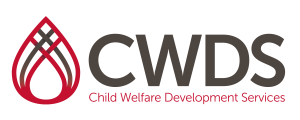CWDS Curriculum
Attachment Issues and Adoption
Level: Advanced Practice – Lineworker
Credits: 6
Intended Audience: This workshop is suitable for: adoptive parents, foster parents, social workers, residential child care workers, special education staff, and other community partners serving attachment disordered children/youth
Intended Objectives:
- To develop a clear understanding of the nature of the attachment relationship, and be able to explain how it differs from other emotional relationships between children and adults
- To outline the specific behaviors which comprise the “attachment cycle”
- To be able to use current research to illuminate the outcomes of positive and negative attachment experiences
- To describe recent developments in brain research as it relates to the early experience of infants and caretakers
- To demonstrate why the prognosis for attachment impaired children is so poor
- To illustrate the special behavior patterns that develop from impaired attachment
- To list the categories of assessment areas and to consider implications for adoption success and treatment interventions
- To outline specific parenting and treatment interventions to remediate the effects of impaired attachment
- To help adoptive parents and long term care-givers cope with the challenges of developing attachment and living with the effects of lack of attachment by describing the meaning of challenging behaviors to the child
Topics Include:
- Description of attachment and the attachment process
- Functions of attachment and importance to human development
- Various causes for attachment disorders
- Assessment issues and processes
- Specific behaviors of children who lack attachment
- The link between attachment and conduct disorders
- Special needs of children who lack attachment
- Therapeutic interventions for attachment problems
- Teaching caregivers to attach
- Child welfare system neglect and attachment problems
- Strategies for helping children to form attachments or teaching them to live with disabilities related to attachment problems
CalSWEC Competencies Addressed:
2.1 Participant is able to identify the multiple family and social forces contributing to child abuse and neglect.
2.3 Participant recognizes and accurately identifies physical, emotional and behavioral indicators of child neglect in children and their families
2.9 Participant recognizes the need to monitor the safety of the child by initial and ongoing assessment of risk.
2.12 Participant understands how attachment, separation and placement affect a child and family and how these experiences may influence a child’s physical, cognitive, social and emotional development.
2.22 Participant demonstrates knowledge and understanding of the termination process, with clients and with systems.
Posted In:Permanency: Reunification, Foster Care and Adoptions



